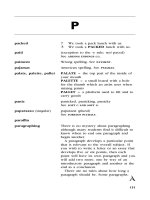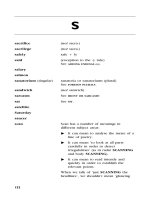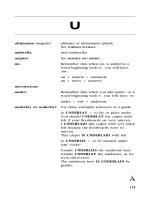Learning A Burt of Correct English_10 pot
Bạn đang xem bản rút gọn của tài liệu. Xem và tải ngay bản đầy đủ của tài liệu tại đây (218.7 KB, 17 trang )
siting or sitting? site + ing = siting
sit + ing = sitting
See
ADDING ENDINGS (i) and (ii).
sizable/sizeable Both spellings are correct.
skein See
EI/IE SPELLING RULE.
skilful
skilfully skilful + ly
slain (exception to -y rule)
See
ADDING ENDINGS (iii).
slander See LIBEL OR SLANDER?.
slily/slyly Both spellings are correct but the second
is more commonly used.
sloping or slopping? slope + ing = sloping
slop + ing = slopping
sly slyer, slyest
slyly See
SLILY/SLYLY.
slyness
smelled/smelt Both spellings are correct.
sniping or snipping? snipe + ing = sniping
snip + ing = snipping
sobriquet/soubriquet Both spellings are correct.
social or sociable? SOCIAL = related to society.
a SOCIAL worker,aSOCIAL problem,
SOCIAL policy, SOCIAL housing
SOCIABLE = friendly
averySOCIABLE person
These two words are quite distinct in
meaning even though they may be used
with the same noun:
a SOCIAL evening = an evening
organised for the purpose of recreation
SOCIAL OR SOCIABLE?
163
TEAMFLY
Team-Fly
®
a SOCIABLE evening = a friendly
evening where everyone mixed well
With any luck the social evening was also
asociableone!
soft c and soft g The letter c has two sounds. It can be
hard and sound like k or it can be soft
and sound like s.
The letter g has two sounds. It can be
hard and sound like g in got and it can be
soft and sound like j.
Usually, but not always, c and g sound
hard when they precede a, o, u:
cat cot cut
gap got gut
They are generally soft when they precede
eandi(andy):
cell cider cyberspace
germ gin gyrate
Sometimes an extra e is inserted into a
word before a, o, u, so that the c or g in
the word can sound soft:
noticeable (not noticable)
manageable (not managable)
Sometimes an extra k is inserted into a
word between c and a, o, u, so that c can
sound hard:
picnicking (not picnicing)
trafficking (not trafficing)
soldier Take care with the spelling of this word.
(soldiers of the Queen, not soliders!)
soliloquy
somebody (not sombody)
somersault
164
SOFT C AND SOFT G
something (not somthing)
some times or Use the exemplar sentences as a guide:
sometimes? There are SOME TIMES when I want to
leave college. (= some occasions)
SOMETIMES Iwanttoleavecollege.
(=occasionally)
soubriquet See
SOBRIQUET/SOUBRIQUET.
souvenir
sovereign (exception to the -ie- rule)
See
EI/IE SPELLING RULE.
sow See
SEW OR SOW?.
spaghetti
speach Wrong spelling. See
SPEECH.
speak
specially See
ESPECIALLY OR SPECIALLY?.
speech (not speach)
speech marks See
INVERTED COMMAS.
spelled/spelt Both spellings are correct.
spilled/spilt Both spellings are correct.
split infinitive The infinitive of a verb is made up of two
words:
to eat, to speak, to begin, to wonder
If a word (or a group of words) comes
between the two words of an infinitive,
the infinitive is said to be ‘split’.
It is not a serious matter at all!
You may sometimes find it is effective
to split an infinitive. Do so. On other
occasions to split the infinitive may seem
clumsy. Avoid doing so on those
occasions. Use your own judgement.
Here are some examples of split
infinitives:
SPLIT INFINITIVE
165
to boldly go where no man has gone
before
to categorically and emphatically deny any
wrongdoing
to sometimes wonder how much will be
achieved
They can easily be rewritten:
to go boldly
to deny categorically and emphatically
to wonder sometimes
spoiled/spoilt Both spellings are correct.
stand Don’t confuse the grammatical formation
of tenses.
We STAND by the window after
breakfast.
We ARE STANDING now.
We HAVE BEEN STANDING for an hour.
We STOOD by the window yesterday.
We WERE STANDING there when you
called.
Never write or say:
We were stood.
say We were standing.
stationary or STATIONARY = standing still (a
stationery? STATIONARY car)
STATIONERY = notepaper and
envelopes
stiletto (singular) stilettos (plural)
See
PLURALS (iv).
stimulant or stimulus? Both words are related to ‘stimulate’ but
there is a difference in meaning:
A STIMULANT is a temporary energiser
like drink or drugs.
A STIMULUS is something that motivates
(like competition).
166
SPOILED/SPOILT
stimulus (singular) stimuli (plural)
See
FOREIGN PLURALS.
stomach ache
stood See
STAND.
storey (plural storeys) STOREY = one floor or level in a
or story (plural stories)?
building
A bungalow is a single-STOREY structure.
A tower block can have twenty
STOREYS.
STORY =atale
IreadaSTORY each night to my little
brother.
Children love STORIES.
strategem or strategy? STRATEGEM = a plot, scheme,
sometimes a trick, which will outwit an
opponent or overcome a difficulty
STRATEGY = the overall plan for
conducting a war or achieving a major
objective
strategy or tactics? STRATEGY =theoverallplanorpolicy
for achieving an objective
TACTICS = the procedures necessary to
carry out the strategic policy
stratum (singular) strata (plural)
See
FOREIGN PLURALS.
subjunctive The subjunctive form of the verb is used
to express possibilities, recommendations
and wishes:
If he WERE a gentleman (and he’s not) he
would apologise on bended knee.
( If he was a gentleman . . .)
If I WERE rich (and I’m not), I would
help you.
( If I was rich . . .)
SUBJUNCTIVE
167
IwishIWERE going with you (and sadly
I’m not!).
( I wish I was going with you .)
I recommend that he BE sacked
immediately.
( . . . he is sacked)
I propose that the treasurer LEAVE the
room.
( leaves)
It is vital that these questions BE
answered.
( . . . are answered)
The subjunctive is also used in these
expressions but there is no change to the
verb.
God SAVE the Queen.
God BLESS you.
Heaven FORBID.
submit submitted, submitting
See
ADDING ENDINGS (iv).
subtle
subtlety
subtly
success (singular) successes (plural)
See
PLURALS (ii).
successful
successfully successful + ly
sufferance
suffixes See
ADDING ENDINGS.
suggest (not surjest)
superlative See COMPARATIVE AND SUPERLATIVE.
supersede (not -cede)
168
SUBMIT
supervise (not -ize)
surfeit (not -ie-, exception to rule)
See
EI/IE SPELLING RULE.
surjest Wrong spelling. See
SUGGEST.
surprise (not suprise or surprize)
surprising
surreptitious
survivor (not -er)
swam or swum? Note these tenses of ‘to swim’:
I SWAM the Channel last year.
IhaveSWUM the Channel five times.
swinging or swing + ing = swinging
swingeing? swinge + ing = swingeing
See
SOFT C AND SOFT G.
swum See
SWAM OR SWUM?.
syllabus (singular) syllabuses or syllabi (plural)
See
FOREIGN PLURALS.
synchronise/ Both spellings are correct.
synchronize
synonym
synonymous
synopsis (singular) synopses (plural)
See
FOREIGN PLURALS.
SYN OPSIS
169
T
tableau (singular) tableaux (plural)
See
FOREIGN PLURALS.
tactics See
STRATEGY OR TACTICS?.
taping or tapping? tape + ing = taping
tap + ing = tapping
tariff (not -rr-)
taught or taut? Use these exemplar sentences as a guide:
Mrs Jenkins TAUGHT maths.
Hold the line TAUT.Pullittight.
technical
tee shirt/T-shirt Both versions are correct.
temperature (four syllables)
tempo (singular) tempi or tempos (plural)
See
FOREIGN PLURALS.
temporarily
temporary (four syllables)
temprature Wrong spelling. See
TEMPERATURE.
tendency (not -ancy)
tenses See
SEQUENCE OF TENSES.
See entries for individual verbs.
terminus (singular) termini or terminuses (plural)
See
FOREIGN PLURALS.
terrible (not -able)
testimonial or TESTIMONIAL = formal statement in the
testimony? form of an open letter bearing witness to
someone’s character, qualifications and
relevant experience
170
TESTIMONY = formal written or spoken
statement of evidence, especially in a
court of law
thank you or (never thankyou!)
thank-you? I should like to THANK YOU very much
for your help.
THANK YOU for your help.
IhavewrittenallmyTHANK-YOU
letters.
You will see that ‘thank you’ is NEVER
written as one word. It is hyphenated
only when used as a compound adjective
describing ‘letter’ or another noun.
Those who care about such things can
never bring themselves to buy otherwise
attractive thank-you cards that have
THANKYOU or THANK-YOU printed on
them!
their, there or they’re? Use these exemplar sentences as a guide:
They have sold THEIR house.
He is waiting for you over THERE.
THERE is no point in lying to me.
THEY’RE going to Krakow for Christmas.
(= they are)
theirs (no apostrophe)
This is my dog; THEIRS has a white
patch on his forehead.
theirselves Incorrect formation. See
THEMSELVES.
themselves They blame THEMSELVES for the crash.
They THEMSELVES were there.
there See
THEIR, THERE OR THEY’RE?.
there is/there are See
SINGULAR OR PLURAL? (iii).
thesis (singular) theses (plural)
See
FOREIGN PLURALS.
they’re See
THEIR, THERE OR THEY’RE?.
THEY’RE
171
thief (singular) thieves (plural)
See
PLURALS (v).
thorough
thoroughly thorough + ly
threshold (not -hh-)
tingeing See
SOFT C AND SOFT G.
tiny (not -ey)
tired (not I am tiered)
I feel very TIRED today.
titbit (not tidbit)
titles When punctuating the title of a book,
film, poem, song, etc., take care to begin
the first word and all subsequent key
words with a capital letter.
Have you read ‘To Kill a Mockingbird’ by
Harper Lee?
Titles can be italicised (in print and word-
processing) or underlined or enclosed in
inverted commas (single or double).
The film Schindler’s List is based on the
book by Thomas Keneally called
Schindler’s Ark.
I’m so pleased that
ADiaryofaNobody
is being serialised.
Have you seen the new production of
‘Macbeth’ at the Barbican?
to, too or two? You should give this TO the police.
Do you know how TO swim?
(part of infinitive = to swim)
IwasTOO embarrassed to say anything.
(= excessively)
Can we come TOO?(=also)
They have TWO houses, one in London
and one in France.
172
THIEF
tolerant (not tollerant or tolerent)
tomato (singular) tomatoes (plural) (an exception to rule)
See
PLURALS (iv).
tomorrow (not tommorrow)
tonsillitis
tornado (singular) tornadoes or tornados (plural)
See
PLURALS (iv).
torpedo (singular) torpedoes (plural) (an exception to rule)
See
PLURALS (iv).
tortuous or torturous? TORTUOUS = full of twists and turns,
complex, convoluted
TORTUROUS = painful, agonising,
excruciating
total
totally total + ly
toupee (n ot toupe
´
e)
traffic trafficked, trafficking, trafficker
See
SOFT C AND SOFT G.
tragedy (not tradgedy)
tragic (not tradgic)
transfer transferred, transferring, transference
See
ADDING ENDINGS (iv).
transpire Strictly speaking, this verb has two
meanings:
" to give off moisture (of plant or leaf)
" to come slowly to be known, to leak
out (of secret information)
It is often used loosely in the sense of ‘to
happen’.
Why not use ‘to happen’ instead of this
rather pompous word?
TRANSPIRE
173
TEAMFLY
Team-Fly
®
travel travelled, travelling, traveller
See
ADDING ENDINGS (iv).
trivia This is a plural noun and should be
matched with a plural verb.
Such TRIVIA are to be condemned.
troop or troupe? TROOP refers to the armed forces or to
groups of people or particular animals:
a TROOP of scouts
a TROOP of children
a TROOP of monkeys
TROUPE refers to a group of touring
actors, dancers, musicians or other
entertainers.
trooper or trouper? TROOPER = cavalry soldier or member
of an armoured unit
He swears like a TROOPER at nine years
old.
TROUPER = a touring entertainer
Jack Densley is a grand old TROUPER.
truly (not truely, an exception to the -y rule)
See
ADDING ENDINGS (ii).
try tried, trying
See
ADDING ENDINGS (iii).
tumulus (singular) tumuli (plural)
See
FOREIGN PLURALS.
turf (singular) turfs or turves (plural)
See PLURALS (v).
twelfth (not twelth, as it is often mispronounced)
twentieth See
ADDING ENDINGS (iii).
twenty
typical
typically typical + ly
174
TRAVEL
U
ultimatum (singular) ultimata or ultimatums (plural)
See
FOREIGN PLURALS.
umbrella (not umberella)
umpire See
REFEREE OR UMPIRE?.
un- Remember that when un- is added to a
word beginning with n-, you will have
-nn-:
un + natural = unnatural
un+nerve=unnerve
unconscious
under- Remember that when you add under- to a
word beginning with r-, you will have -rr-:
under + rate = underrate
underlay or underlie? Use these exemplar sentences as a guide:
to UNDERLAY = to lay or place under
You should UNDERLAY the carpet with
felt if your floorboards are very uneven.
I UNDERLAID this carpet with very thick
felt because the floorboards were so
uneven.
This carpet IS UNDERLAID with felt.
to UNDERLIE =tobesituatedunder
(esp. rocks)
Granite UNDERLIES the sandstone here.
Granite UNDERLAY the sandstone, as we
soon discovered.
The sandstone here IS UNDERLAIN by
granite.
175
also:
The UNDERLYING problem is poverty.
Compare
LAY OR LIE?.
underrate under + rate
undoubtedly
unequivocally unequivocal + ly (not unequivocably)
unexceptionable or UNEXCEPTIONABLE = inoffensive, not
unexceptional? likely to cause criticism or objections
UNEXCEPTIONAL = ordinary, run-of-
the-mill
Compare
EXCEPTIONABLE OR EXCEPTIONAL?.
unget-at-able (not un-get-at-able)
uninterested See
DISINTERESTED OR UNINTERESTED?.
unique Remember, that ‘unique’ is absolute. It
means ‘the only one of its kind’.
Something is either unique or it’s not. It
can’t be ‘quite unique’ or ‘very unique’.
unmanageable (not unmanagable)
See
SOFT C AND SOFT G.
unmistakable/ Both spellings are correct.
unmistakeable
unnatural un + natural
unnecessary un + necessary
unparalleled
until (not untill)
unusually unusual + ly
upon (not apon)
upstairs (one word)
urban or urbane? URBAN = relating to a town or city
URBAN population
URBANE =suave,courteous
176
UNDERRATE
used to I USED TO like him very much
The negative form is:
I USED NOT TO like him very much.
I didn’t used to like him.
useful
useless
usurper (not -or)
USURPER
177
V
vase
vechicle Wrong spelling. See
VEHICLE.
vegetable (not vegtable)
vegetation
vehicle (not vechicle)
veil See
EI/IE SPELLING RULE.
vengeance (not vengance)
See
SOFT C AND SOFT G.
ventilation (not venta-)
veracity or voracity? VERACITY =truthfulness
VORACITY =greed
veranda/verandah Both spellings are correct.
vertebra (singular) vertebrae (plural)
See
FOREIGN PLURALS.
veterinary (five syllables!)
vice versa
vicious
view
vigorous (not vigourous)
See also
RIGOROUS OR VIGOROUS?.
vigour
villain
violent
virtuoso (singular) virtuosi or virtuosos (plural)
See
FOREIGN PLURALS.
visible (not -able)
178
visitor (not -er)
vocabulary (five syllables)
volcano (singular) volcanoes or volcanos (plural)
See
PLURALS (iv).
voluntary
volunteer volunteered, volunteering
voracity See
VERACITY OR VORACITY?.
vortex (singular) vortexes or vortices (plural)
See
FOREIGN PLURALS.
vowels Five letters of the alphabet are always
vowels:
aeiou
The letter y is sometimes a vowel and
sometimes a consonant. It is a vowel
when it sounds like e or i:
pretty, busy
sly, pylon
Y is a consonant at the beginning of
syllables and words and has a different
sound:
yellow, beyond
VOWELS
179









